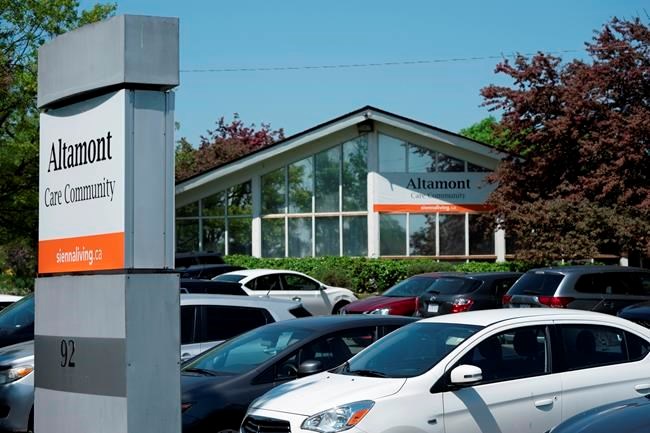CALGARY — The owners of Canada's private nursing homes are under increasing pressure from investors and critics alike as infections and deaths from the COVID-19 outbreak continue among the country's oldest and most vulnerable citizens.
Share prices of three of Canada's publicly traded nursing home owners have fallen by at least a third this year while labour organizations and NDP Leader Jagmeet Singh call for the elimination of private ownership and at least two class-action lawsuits have been proposed.
On Wednesday, Ontario Premier Doug Ford said the province will take over management of five long-term care homes, four of which were named in a Canadian Armed Forces report detailing recent "horrific'' treatment of residents.
Shares in Sienna Senior Living Inc., operator of two of the homes falling under provincial control, plunged by 6.8 per cent on Thursday to close at $9.84, a near 10-year low that's almost half their $19.64 close on Feb. 18.
The company runs the Altamont Care Community in Scarborough, Ont., named in the Armed Forces report for inadequate care and feeding of residents due to insufficient staffing during the pandemic. The virus is blamed for 52 deaths there.
"COVID-19 has had a severe impact on staffing at Altamont. To deliver the level of care that our seniors deserve, the staffing challenges we face in the long-term care sector must be addressed," said Sienna in a statement posted on its website on Tuesday.
Sienna also operates the Camilla Care Centre in Mississauga, Ont., where the province is also taking over operations after at least 61 residents died from the coronavirus.
Sienna declined an interview request Thursday.
Meanwhile, shares in two other Canadian nursing home operators also fell Thursday, although neither was mentioned in the military's report.
Extendicare Inc. slipped one per cent for a total drop of 33 per cent so far this year and Chartwell Retirement Residences fell 3.2 per cent for a year-to-date slide of 41 per cent.
"A large number of seniors care facilities getting impacted by COVID-19 cases in Canada and the U.S. has created a sense of anxiety about the future profitability of this industry," said analyst Yashwant Sankpal of Laurentian Bank Securities in a report last week.
He pointed out the crisis could eventually lead to more public investment in the sector to allow upgrades to older, crowded facilities that need it most, which would benefit the companies he covers.
Owners of facilities in Canada agree there are many things wrong with the long-term care system but say private ownership is not one of them.
A preliminary analysis by the Ontario Long Term Care Association, which represents both private and public facilities, showed that the magnitude of the outbreak hasn't varied according to ownership.
Instead, severity depended on whether the outbreak started before the province implemented its support program, the staffing situation before and during the outbreak, if the home is older and more crowded with four-bed shared rooms, and the amount of external support when needed.
"Nearly half of Ontario's long-term care homes are older, and infection control, cohorting and isolation are more challenging in these sites," said the statement attributed to CEO Donna Duncan.
It added that a provincial program designed to rebuild older homes by 2025 is behind schedule.
The assertion contradicts a call from the Canadian Labour Congress to eliminate private ownership and put long-term care under federal jurisdiction.
"The tragedy we're seeing is a direct result of the move to a for-profit model. Long-term care must be offered as a public service," said CLC president Hassan Yussuff in a news release.
As Canada's population ages, statistics show spending on long-term care is up.
Operating revenue for nursing and residential care facilities controlled by private organizations grew by 25 per cent from $9.3 billion in 2014 to $11.6 billion in 2018, according to the most recent data from Statistics Canada.
Operating revenue for facilities controlled by public organizations grew by 12 per cent from $15 billion to $16.8 billion in the same four years, it says.
Dr. Samir Sinha, director of health policy research at the National Institute on Ageing at Ryerson University, says it is "simplistic" to say for-profit facilities are more likely to have COVID-19 outbreaks than not-for-profit homes because both are having problems.
The reason for-profit homes appear to be more severely affected could be because there are more of them, he said, noting about 60 per cent of Ontario's 626 long-term nursing care homes are privately owned.
Nursing homes in Canada are regulated by provinces and territories and rules vary. In Ontario, for instance, about 16 per cent of facilities are owned by municipalities because provincial law requires it, Sinha said.
Funding in Canada is generally made available on a per-resident basis depending on that person's level of care whether the licenced operators are private, non-profit or municipal, he added.
Private operators make money in part through economies of scale, which gives rise to the development of large corporations with dozens of facilities in multiple jurisdictions, said Sinha.
These companies often also operate "retirement residences," where the tenants pay 100 per cent of the costs and there is no public funding.
Revera Living, one of Canada's largest private operators with 74 long-term care homes and 10,000 residents, is the subject of proposed class action lawsuits in Ontario and Alberta which allege it did not follow proper protocols to prevent an outbreak of COVID-19.
In an email, spokesman Larry Roberts said studies have shown the level of care Revera provides is better than Ontario and Canadian averages, but the company acknowledges Canada's overall care system could be improved.
He said there was an acute need before the pandemic struck to deal with ongoing issues of training, staffing, wages and investments in the redevelopment of aging long term care infrastructure.
This report by The Canadian Press was first published May 28, 2020.
Companies in this story: (TSX:SIA, TSX:EXE, TSX:CSH.UN)
Dan Healing, The Canadian Press



